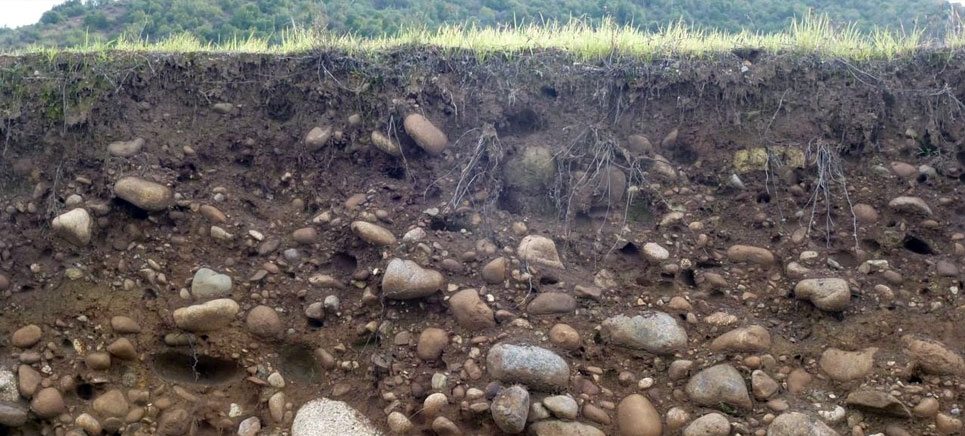Alluvial Soils are the soils deposited by surface water. So, they are found commonly along rivers, floodplains and deltas. The alluvial soil of Coastal regions is known as Riverine. The alluvial soil is considered an important type of soil as it plays important role in our ecosystem. Alluvial soil is one of the most fertile soils for cultivation. Further, it removes nutrients and other sediments from the flowing water thus improving the water quality for downstream areas.
Characteristics of Alluvial Soils
Alluvium consists of silt, sand, clay, gravel and a good amount of organic matter. The alluvial soils are of recent origin and hence have weak profiles. Alluvial soils have a unique layered look as flood keeps depositing new layers over the earlier one. This process of layering, called stratification, is evident in many floodplains. The alluvial soils are considered to be immature soil as their soil profile remains incomplete. The texture of alluvial soil is loamy; it contains a mixture of sandy and clayey soils. Alluvial soil vary in texture because it has been formed due to erosion, transportation and deposition activities of the rivers. The texture makes it a porous soil with good drainage. The river or stream flows frequently replenish the soil making it one of the most fertile soils for crop cultivation.

The alluvial soils generally have a low content of nitrogen but they contain a good amount of alkalies, potash and phosphoric acid. The proportion of iron oxide and lime keeps varying within a large range. A large part of the global supply of tin ore comes from alluvial soil. In some regions of the world, the alluvial deposits also contain gold, platinum and gemstones. The color of the alluvial soils varies from the light grey to ash grey depending on the depth of the deposition, the texture of the materials, and the time taken for attaining maturity.
Alluvium and Soil Pollution
The alluvial soils are formed by flooding and are normally considered fertile, but, this is not always the case. The amount and type of sediments brought by the rivers are affected by many human activities such as deforestation, various construction and agriculture activities. These human activities increase the pace of erosion and thus a large number of sediments are brought downstream. These eroded soils and nutrients sometimes can be good. But, there are occasions when these flood-depositions brings contamination from the upland pollution.
Urban and industrial areas have increased the risk of floodplains containing potentially harmful chlorinated compounds and trace metals. The contamination of soil is not always visible and can be ascertained only by soil testing.
Alluvial Soils for Agriculture
Alluvial Soils are considered the best for agriculture. They respond well to various irrigation systems including well and tube-well systems. They are good for various crops including rice, wheat, sugarcane, tobacco, maize, oilseeds, vegetables and fruits.
Use the citation below to add this article to your bibliography
"Alluvial Soils: Meaning, Characteristics and Importance for Agriculture." Dashamlav.com. Web. 22 October 2024. <https://dashamlav.com/alluvial-soils-meaning-characteristics-fertile-agriculture/>
Dashamlav.com, "Alluvial Soils: Meaning, Characteristics and Importance for Agriculture." Accessed 22 October 2024. https://dashamlav.com/alluvial-soils-meaning-characteristics-fertile-agriculture/
"Alluvial Soils: Meaning, Characteristics and Importance for Agriculture." (n.d.). Dashamlav.com. Retrieved 22 October 2024 from https://dashamlav.com/alluvial-soils-meaning-characteristics-fertile-agriculture/
